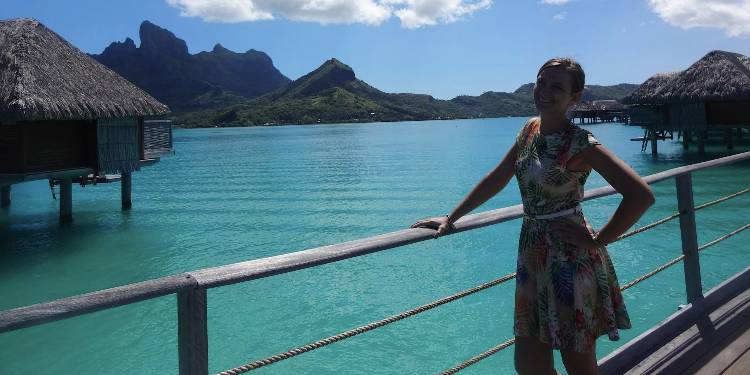
Originally from France, Clémentine spent her childhood in Madagascar before getting the travel bug. She talks to us about her first experiences of island life as an expat and her recent move to Bermuda.
You have been traveling from a very young age. Tell us about your childhood.
I took my very first trip when I was one year old. We flew from Marseilles to Antananarivo (Madagascar) with my parents, and I stayed there until I was 18. I grew up in Madagascar, and, paradoxically, I didn't really travel much until I finished my studies. When I used to live with my parents in Madagascar, the only times we traveled were to visit my grandparents in France every summer.
You then pursued your studies in France. How did you feel about moving back to the country where you were born?
I left home after my baccalaureate to study foreign languages at the University of Nice. It was a real discovery for me, and I got to live new experiences at all levels every single day. I was discovering independence, living alone, having to cater to my needs, going to college, etc. It was quite challenging at first as I used to miss Madagascar a lot. I had a tough time getting used to life there, especially the people and the cold. But in the end, it felt good to be back in France.
You then spent seven years in Bora-Bora. What brought you there?
Since I spent a huge part of my life in Madagascar and I studied tourism, my only desire was to discover the world. My parents had friends in Tahiti, and they welcomed me before I managed to find a job there. I spent 3 months in Tahiti until I finally found my first "real" job in a luxury hotel in Bora-Bora. Bora-Bora is a magnificent island from every point of view, and I stayed there for seven years. The life there is sweet and simple. The people are kind and welcoming, and there's a very strong culture there. I also had the opportunity to travel to all the neighbouring countries, such as Japan, Hawaii & the west coast of the United States, Bali, Australia, etc.
What brought you to Bermuda, then?
I recently arrived in Bermuda for a new position as a Front Desk/Concierge/Guest Experience Manager. This experience is really different because Bermuda is an island that is part of England. One of the major changes here is that we drive on the left. The culture is not so strong in Bermuda, but the people are lovely and welcoming. You don't come to Bermuda for the food either because, unfortunately, the American influence of junk food is very present. The climate isn't tropical. Many people think that Bermuda is all about warm seas, but this is not the case. Bermuda is right in the middle of the Atlantic Ocean, between New York and Florida, and therefore not in the Caribbean as many think. So this island does not have a tropical climate, and it is cool in winter (from October to March). Temperatures vary between 15 and 20ºC at this time.
What was really surprising here was the very lush vegetation; there are as many tropical flowers as fir trees. It was quite easy to adapt here; however, it is one of the world's most expensive islands since everything is imported there, and there is no local production. Salaries are, therefore, high, but the cost of living is almost indecent. Everything is expensive, and it can be frustrating.
Where do you see yourself in the long run? Are you planning to settle somewhere?
In the longer term, I would like to combine my passion for travel with my job in the hotel industry and discover more places. I want to feel the pride of living in such places and make people dream a little through my experiences. Maybe one day I'll settle somewhere permanently, but I haven't thought of it for now.
What do you enjoy most about your nomadic life and the least?
I love discovering new cultures and meeting new people. I missed speaking English daily (I love the language).
What I like least is thinking that I don't really have a base. I'm a little lost about my roots. My life fits in 3 suitcases of 23 kilos each.
Do you have any advice for expats who want to work in the restaurant industry?
In my opinion, moving abroad is one of the best choices I have ever made. It helped me become open-minded and gave me the chance to meet amazing people through my travels and jobs. Unlike France, where the hotel/restaurant industry is controversial because of the number of unpaid hours, moving abroad for work is a new challenge in itself and adds a positive asset to the CV.



















